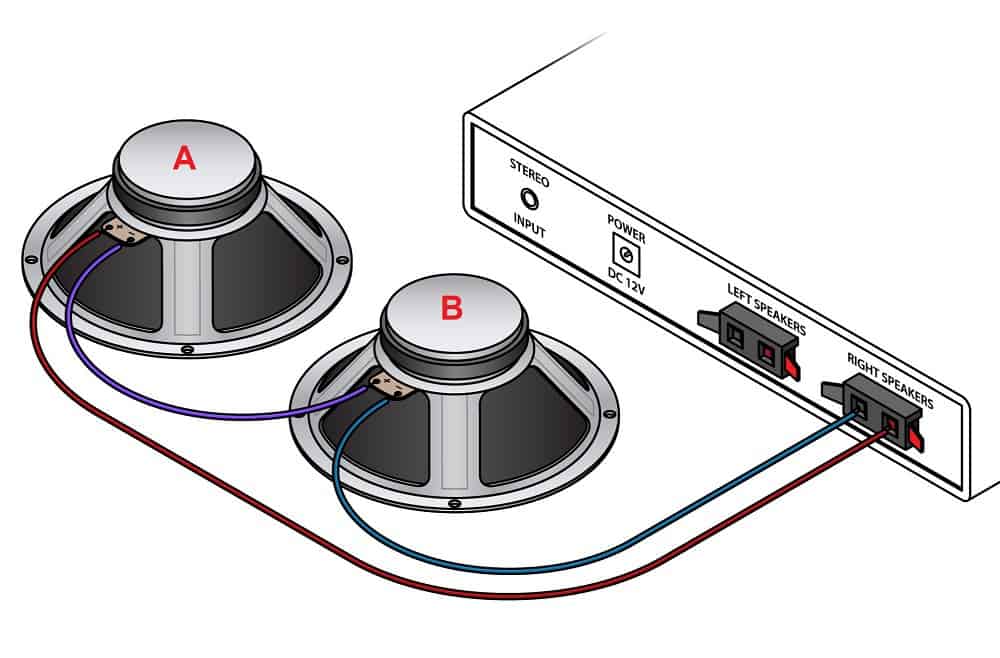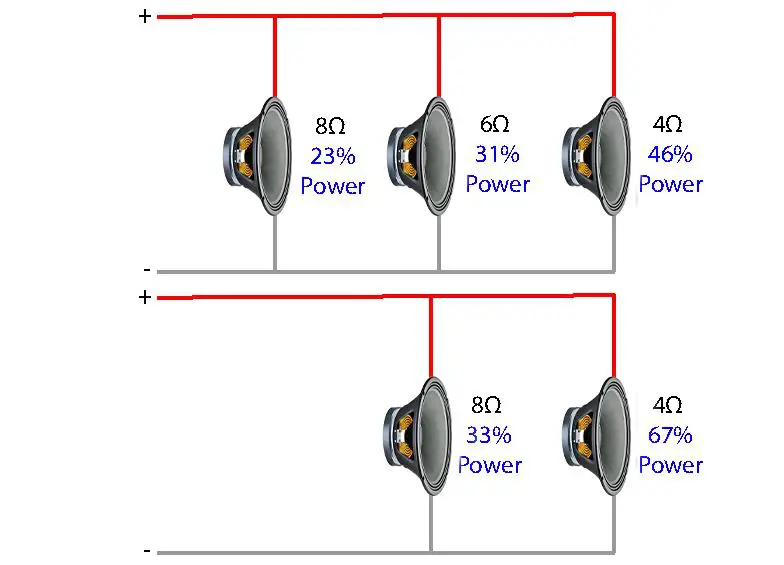Simple Info About Which Is Better, 8ohm Or 4ohm

Understanding Impedance
1. What Exactly Are Ohms Anyway?
Okay, let's talk about impedance, or as we're focusing on today, 8ohm or 4ohm. It sounds super technical, but its really just a measure of how much a speaker resists the electrical signal coming from your amplifier. Think of it like this: your amp is trying to push electricity through the speaker, and the impedance is how hard the speaker pushes back. Higher impedance (like 8 ohms) means more resistance, while lower impedance (like 4 ohms) means less resistance. It's kind of like trying to run through molasses versus running through air — both are "running" but one is clearly easier.
Now, why does this matter? Well, the impedance of your speakers needs to match the capabilities of your amplifier. If they don't play nicely together, you could end up with either weak sound or, worse, a blown amp. That's definitely not the party vibe we're going for, right?
This resistance is measured in ohms (), hence the terms 8ohm or 4ohm. In a nutshell, it's all about how well your speakers and amp work together. The goal is harmony, not a power struggle!
So, before you plug in those shiny new speakers, let's dive deeper into the nuances of 8 ohms versus 4 ohms to avoid any audio disasters.

What Does 4 Ohm Speaker Mean
Delving into 8 Ohm Speakers
2. The Classic Choice
8 ohm speakers are pretty much the standard in the audio world. They're like the reliable sedan of the speaker family — dependable, widely compatible, and generally safe. Most amplifiers are designed to work well with 8 ohm speakers, making them a safe bet for most setups. Think of it as the "plug and play" option for audio enthusiasts.
Because of their higher impedance, 8 ohm speakers put less strain on the amplifier. This means your amp doesn't have to work as hard to deliver power to the speakers. The benefit? A cooler running amp, potentially longer lifespan, and less chance of overheating. Plus, with less strain, the amp might even sound a little cleaner and more efficient. It's like a well-rested athlete performing at their best!
However, this also means that for the same amount of power output from the amplifier, an 8 ohm speaker will generally produce less volume than a 4 ohm speaker. So, if youre looking to really crank up the volume and fill a large room with sound, 8 ohms might not be your first choice, depending on your amp's power. But for most home listening scenarios, 8 ohms offer a great balance of sound quality and amplifier protection.
So, if you're unsure or just want a hassle-free setup, 8 ohms are generally the way to go. They're like that friend who always has your back, audio-wise.
Unleashing the Power of 4 Ohm Speakers
3. More Juice, More Sound? Understanding 4 Ohms
Now, let's talk about 4 ohm speakers. These guys are the sports cars of the speaker world — they're powerful, can deliver a lot of sound, but require a bit more attention to ensure they don't crash and burn. The lower impedance of 4 ohms means they draw more current from the amplifier. In essence, they're asking the amp to work harder.
The upside of this increased demand is that, for the same power output from the amplifier, a 4 ohm speaker will typically produce more volume than an 8 ohm speaker. This can be great if you're looking to fill a large space with sound or just want that extra oomph for your music. It's like adding a turbocharger to your audio system.
However, here's the catch: driving 4 ohm speakers puts a greater load on your amplifier. If your amp isn't designed to handle 4 ohm loads, it could overheat and potentially fail. It's like pushing a car engine beyond its limits — eventually, something will break. Therefore, it's crucial to check your amplifier's specifications before connecting 4 ohm speakers. Many amps are labeled to indicate their minimum impedance. Pay attention to that!
If your amplifier is rated for 4 ohms, you can enjoy the benefits of increased volume and potentially a more dynamic sound. Just make sure your amp can handle the heat (literally!) and you're not pushing it too hard for extended periods. It's all about responsible power.

Are 4 Ohm Speakers Better Than 8 Speakers? BoomSpeaker
Matching Speakers and Amps
4. Avoiding Audio Mishaps
The most critical aspect is compatibility. Refer to your amplifier's manual (yes, that thing you probably threw away) to find its minimum impedance rating. This tells you the lowest impedance speaker it can safely drive. If the manual states "8 ohms minimum," then using 4 ohm speakers is a no-go. It's like trying to fit a square peg in a round hole — it just won't work and could cause damage.
If your amplifier does support 4 ohm speakers, you're in the clear... mostly. Keep an eye (or an ear!) on the amplifier's temperature. If it starts getting excessively hot, it's a sign that it's working too hard. Turning down the volume can help alleviate the strain. Think of it as giving your amp a little breathing room.
One common misconception is that using a higher impedance speaker (like 8 ohms) with an amplifier rated for 4 ohms will cause damage. This is generally not true. While you might not get the maximum possible volume from the amplifier, it won't harm the amp. It's like having a car that can go 150 mph, but you only drive it at 65 mph — the car is perfectly fine, just not being used to its full potential. However, constantly pushing an amp beyond its rated limits will lead to problems, regardless of the speaker impedance.
In short, always err on the side of caution. When in doubt, consult the manuals or ask an audio professional. A little research can save you from costly repairs or replacements. Nobody wants a smoking amp instead of sweet sounds, right?

Making the Choice
5. The Bottom Line
So, after all that talk about impedance and ohms and amplifiers, which is actually better? Well, the honest answer is... it depends! There isn't a universally "better" option; it's all about what suits your specific needs and equipment.
If you have a lower-powered amplifier or one that isn't specifically rated for 4 ohm loads, sticking with 8 ohm speakers is the safer and more practical choice. You'll get reliable performance without risking damage to your amp. It's like choosing a sensible, fuel-efficient car for your daily commute.
On the other hand, if you have a robust amplifier that's designed to handle 4 ohm loads and you're looking for maximum volume and dynamic range, then 4 ohm speakers might be the way to go. Just be sure to keep an eye on your amp's temperature and avoid pushing it too hard. It's like choosing a high-performance sports car for a weekend track day — exciting, but requires some caution.
Ultimately, the best choice is the one that provides the best sound quality and reliability within the limits of your equipment. Do your research, understand your gear, and listen carefully. And if you're ever unsure, don't hesitate to seek advice from a trusted audio professional. Happy listening!
